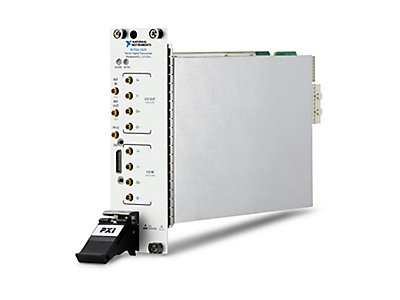- National Instruments announced a baseband model of the second-generation Vector Signal Transceiver (VST).
- The PXIe-5820 module is a baseband VST with 1 GHz of complex I/Q bandwidth.
- This modular instrument is designed to address RF front-end module and transceiver test applications, such as envelope tracking, digital pre-distortion and 5G test.
- New baseband Vector Signal Transceiver has 12X the bandwidth, a 50 percent smaller footprint and a larger user-programmable FPGA.
The PXIe-5820 combines a wideband I/Q digitizer, wideband I/Q arbitrary waveform generator and user-programmable FPGA into a single 2-slot PXI Express module. With 1 GHz of complex I/Q bandwidth, the baseband VST suits a range of applications including baseband I/Q testing of wireless and cellular chipsets as well as envelope tracking of digitally pre-distorted waveforms for power amplifier, and generation and analysis of new wireless standards such as 5G, 802.11ax and LTE-Advanced Pro.
Product Features:
- 1 GHz of complex I/Q instantaneous bandwidth for generation and analysis
- Measure of 802.11ax error vector magnitude (EVM) of -54 dB
- Baseband 2-channel differential I/Q with 4 Vpp differential input and 2 Vpp differential output swing
- Compact size and tight synchronization of baseband and RF VSTs allowing for 2×2, 4×4, 8×8 or higher multiple input, multiple output (MIMO) configurations in the PXI form factor
- User-programmable FPGA that engineers can customize to add application-specific functionality
The baseband VST can be synchronized with the PXIe-5840 RF VST to sub-nanosecond accuracy, to offer a complete solution for RF and baseband differential I/Q testing of wireless chipsets.






